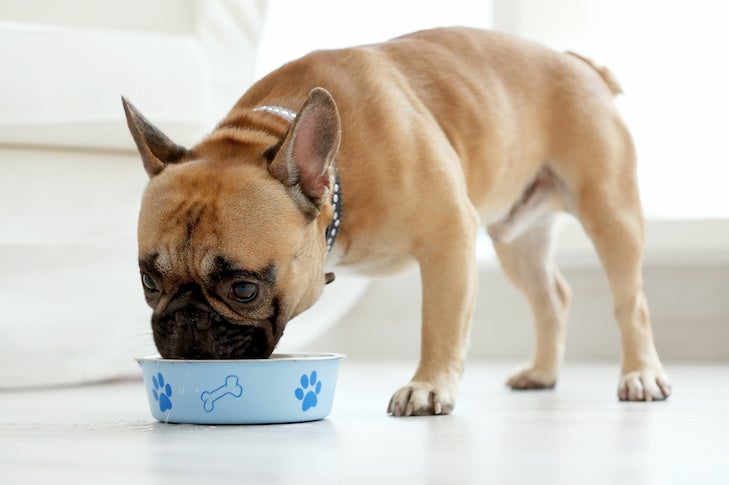Does it seem like your dog suddenly has lost interest in eating food? Knocks over their bowl out of boredom with their food? While it could mean you have a picky eater on your hand, changes in appetite could also signal a greater health problem that should be addressed right away, particularly in young puppies, senior dogs, or pets with known underlying health conditions.
Is My Dog a “Picky Eater” or Behaving Normally?
“The saying goes, ‘Some dogs eat to live, other dogs live to eat,'” says Dr. Jerry Klein, Chief Veterinary Officer of the American Kennel Club.
Some eating habits can be tied to your dog’s genetics – with some breeds known to have heartier appetites, but much of it is due to the environment, he explains.
When you feed your dog, how long does it take your pet to finish? The answer to that question is usually a good indicator of whether they’re being a picky eater.
Dogs that don’t empty their food bowls within a certain amount of time, usually about 20 minutes, are more likely to be considered “picky eaters,” according to Dr. Klein.
Another sign of picky eating? Pets that refuse to eat their own dog food but are perfectly happy to accept human table scraps may also fall into that category of “picky eater,” says Dr. Klein.
“Of course, one has to be sure there is no underlying medical condition causing this erratic appetite,” he adds, explaining that a veterinarian should always be contacted if there is an appetite change that lasts longer than 24 hours.
How Genetics Impact Appetite
Breeds like Pugs and Labradors are notorious for having ravenous appetites, while others like sighthounds are lean by nature, says Dr. Klein. Sighthounds eat, but due to their fast metabolisms, they gain little to no weight.
How Environment Impacts Appetite
Though feeding your dog may sound straightforward, how and when you give your pet food can affect how much they eat.
To avoid picky eating behavior, Dr. Klein recommends creating a consistent feeding routine:
- Set and stick to a mealtime schedule to the degree possible.
- Leave food out for no longer than 15 to 20 minutes.
- If your dog doesn’t eat anything, take the bowls away.
- Don’t give your pet any more food or treats until their next scheduled feeding time.
“Leaving food out long term encourages bad eating habits and is unsanitary,” Dr. Klein explains.
Stress, absent pet owners, and social and emotional upheaval to a pet’s daily routine could also explain why your dog isn’t eating.

How Diet Impacts Appetite
If the pet food you’re feeding your dog is complete and balanced, your pet has a healthy weight, and the stool looks normal, then your dog likely doesn’t have any problems with the food you’re serving, says Dr. Klein.
Some pets, on the other hand, may have dietary sensitivities or food allergies, which could explain their appetite.
Any sudden changes to your dog’s feeding could cause problems like gastroenteritis (diarrhea with or without vomiting). To avoid this any change to your pet’s diet should be done gradually, transitioning between the former type of food to the new type over the course of 4 to5 days rather than immediately or “cold turkey” to prevent gastroenteritis that could lead to your dog’s change in appetite.
If there’s any concern with your pet’s appetite, always discuss what steps to take with your veterinarian before making any changes, says Dr. Klein.
When “Picky Eating” Could Be a Signal of an Underlying Health Problem
As a general rule: You should consult your pet’s vet if your dog experiences a significant appetite change that lasts longer than 12 to 24 hours and does not return to normal, says Dr. Klein.
There are some exceptions to this guideline. Families with puppies or dogs that meet the following criteria should contact their dog’s vet right away, without waiting for 12 to 24 hours to pass, for advice:
- Young puppies (less than six months of age)
- Pets experiencing change of appetite accompanied by gastrointestinal symptoms, such as vomiting and/or diarrhea
- Dogs with a diabetes diagnosis
- Dogs (especially senior dogs) that seem to want to eat but do not, or will only eat soft food
“In these cases, any missed meal or decrease in appetite should be an alert to the owner to notify a veterinarian as soon as possible for advice,” explains Dr. Klein.
Celebrate the June “AKC Treat of the Month” with 35 % off low-calorie items from the Tricky Trainer and Wag More Bark Less brands. These treats are sure to please even the pickiest eater, and you don’t have to feel guilty about it! Offer valid June 1 to June 30. Use promo code 35LOWCAL during checkout on Amazon. One bag per order eligible for discount.


